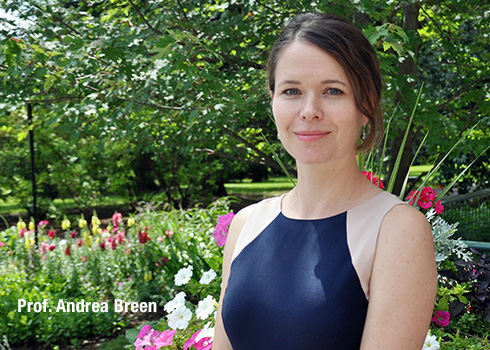Storytelling isn’t just a childhood pastime, it continues throughout adulthood as a means of defining ourselves, says Prof. Andrea Breen, Family Relations and Applied Nutrition.
“Identity is constructed through stories,” she says, and the stories we tell about ourselves change throughout our lives, reflecting our family background, culture and relationships. New experiences and people in our lives change our stories. “Those stories both communicate who we are but also help construct our own understanding of who we are.”
Working with Prof. Carla Rice, Canada Research Chair in Care, Gender and Relationships at U of G, Breen is a co-investigator on a digital storytelling project led by Prof. Susan Dion at York University. The project asks aboriginal students and teachers to make short films about their experiences in the education system using spoken word, music and imagery.
The digital stories will be shown to teachers, students in teacher education programs, school board staff and others. “A major part of the goal is education and social change,” says Breen. “When people share their stories and get insight into other people’s experiences, it’s important for breaking down stereotypes, and also for helping people to understand other people’s experiences.”
Breen is interested in how storytelling affects the storyteller, particularly those who are marginalized. Does sharing their stories help them feel heard and recognized? Does hearing the stories of their peers help them feel a sense of belonging and purpose?
 With her background in risk and prevention, Breen worked at East Metro Youth Services in Scarborough where she led violence intervention programs, including a program for students expelled from the regular school system. Many of the students came from low-income, marginalized families and communities, she says. “All of our students really wanted to make changes in their lives, and they faced a lot of difficult barriers in making those changes.”
With her background in risk and prevention, Breen worked at East Metro Youth Services in Scarborough where she led violence intervention programs, including a program for students expelled from the regular school system. Many of the students came from low-income, marginalized families and communities, she says. “All of our students really wanted to make changes in their lives, and they faced a lot of difficult barriers in making those changes.”
Although many students were able to make lasting positive changes in their lives, not everyone was successful. She wanted to learn why some students were able to turn their lives around while others were not. “To me it seemed like one big difference in the kids who were successful and the ones who weren’t was in their identity,” she says. Those who were able to change their understanding of themselves went on to make positive changes in their lives.
Storytelling has also played a part in Breen’s role as chief scientist at kidü, a parenting app with hundreds of activities that foster parent-child interaction. Using developmental, health and educational research, the app provides parents with tips on how to get the most out of each activity with their children.
“Kidü has a huge storytelling component,” she says. The app includes a storyboard where parents can post photos and anecdotes of their children, making kids the main characters of their own stories.
“Storytelling is really important for children’s development,” says Breen. “Kids who come from families where there’s lots of storytelling tend to be stronger in terms of their language, relationships and emotional well-being.”
